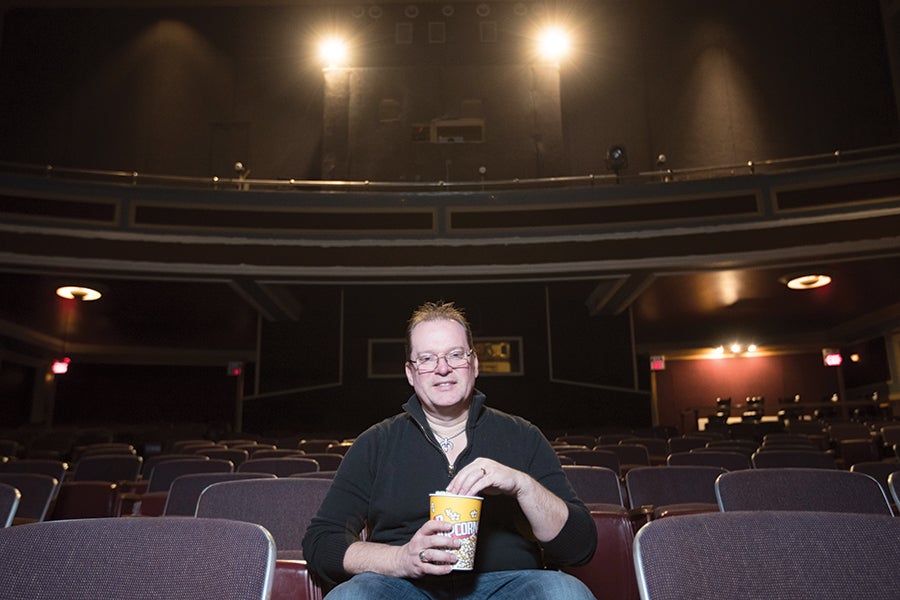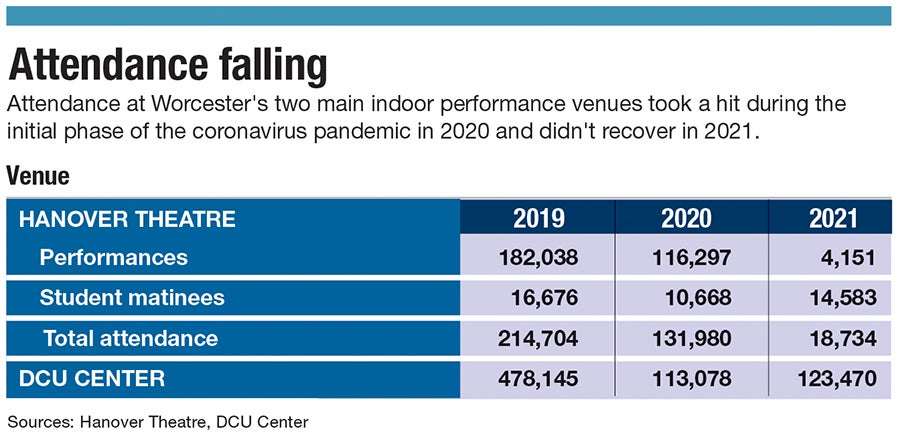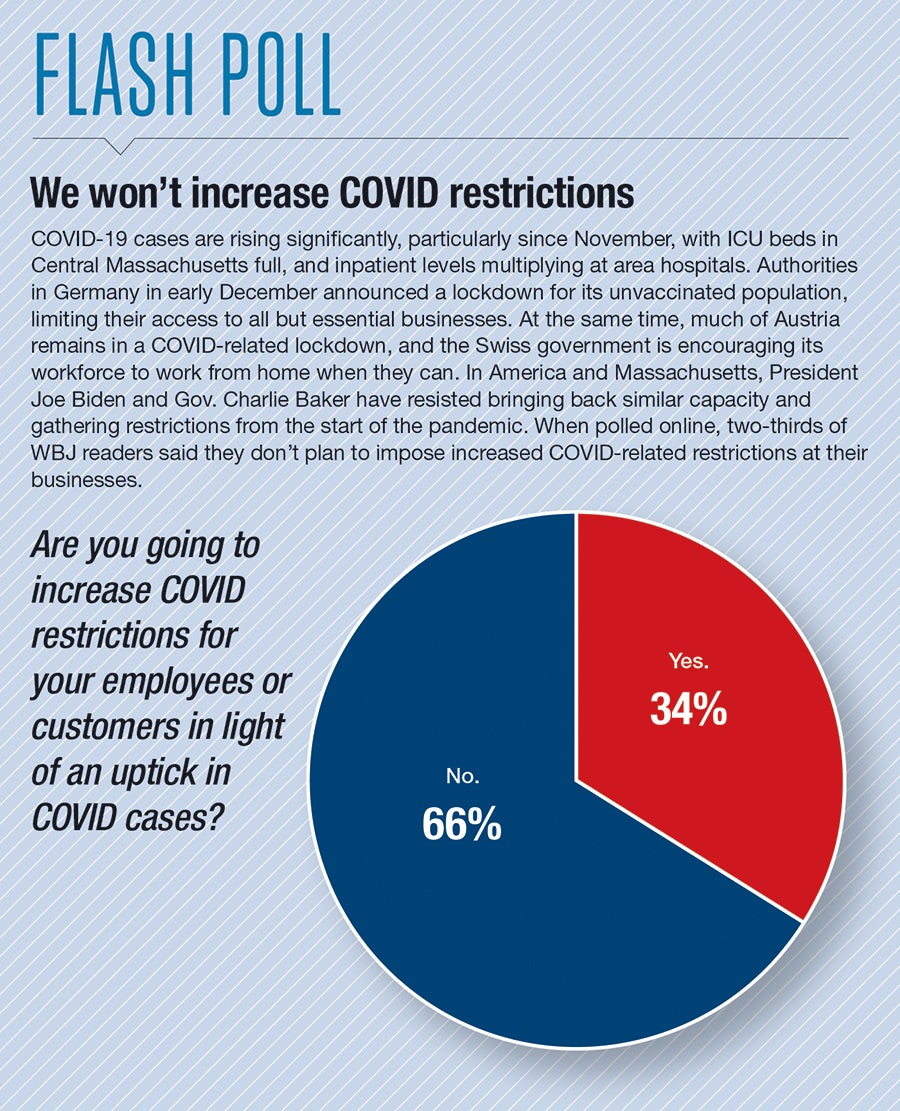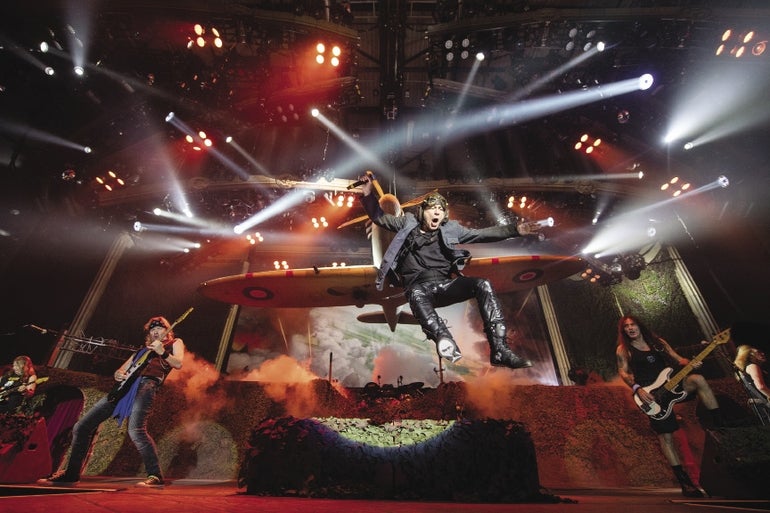The coronavirus lockdowns began in March 2020 lasted longer for indoor performance venues than nearly every other type of business, cutting off the main revenue streams for these Central Massachusetts hubs for arts and culture until May 2021.
Get Instant Access to This Article
Subscribe to Worcester Business Journal and get immediate access to all of our subscriber-only content and much more.
- Critical Central Massachusetts business news updated daily.
- Immediate access to all subscriber-only content on our website.
- Bi-weekly print or digital editions of our award-winning publication.
- Special bonus issues like the WBJ Book of Lists.
- Exclusive ticket prize draws for our in-person events.
Click here to purchase a paywall bypass link for this article.
The coronavirus lockdowns began in March 2020 lasted longer for indoor performance venues than nearly every other type of business, cutting off the main revenue streams for these Central Massachusetts hubs for arts and culture until May 2021.
Now, just as businesses have reopened and tried to find new footing as audience preferences have shifted, COVID variants are once again posing a public safety hazard. Iconic venues such as The Strand Theatre in Clinton have closed due to the ongoing toll of the pandemic. In this ever-evolving landscape, entertainment-based businesses face liabilities as they wonder if they can survive yet another hit to their industry.

“We are operating under this new reality, this new pandemic world where the costs are higher, the income is lower, and everything is more difficult,” said Troy Siebels, president and CEO of The Hanover Theatre in Worcester.
An icon falls
On Dec. 9, The Strand Theatre announced it was permanently closing because audiences weren’t returning in the same pre-pandemic numbers, leaving the venue unable to financially recuperate from the pandemic lockdowns, which left the venue closed for 15 months.

Built in 1924, Rob Nierintz and Bill Grady purchased The Strand nine years ago. An iconic destination serving generations of movie-goers, Nierintz implemented creative strategies and events to entice patrons to return. While special events helped, the day-to-day movie attendance diminished.
Nierintz said movie-goers’ apprehension was a major reason for the decline. Not only did the theater have to overcome its losses from the lockdown, but new variants and escalating case numbers made patrons pause about going back to indoor shows. Plus, people were used to streaming movies at home, and movie studios were catering to that.
“It is a downstream effect that affects people in seats whether they are in theaters or restaurants. Ultimately, it comes down to the bottomline,” Nierintz said.
Weathering the storm
When the DCU Center in Worcester reopened, the venue was able to retain 90% of its full-time staff and 100% of its part-time staff, quite a feat considering the lockdown brought the center to a complete standstill.

DCU Center General Manager Sandy Dunn said the center has less available product as touring shows are postponing because of the pandemic.
An ionization system, line management equipment, and cashless purchasing/ticketing services are all innovations the DCU Center has implemented to make the space a safer environment. The goal is to keep audiences safe while instilling confidence in patrons who wish to experience live performances.
“If we have learned anything from the past two years, it is that we always need to be thinking about contingency plans and remain flexible. We have and will continue to follow the directives of the [U.S. Centers for Disease Control] and our state and local health officials,” said Dunn.
Staffing is normally a challenge the DCU Center faces each season due to the part-time nature of the positions, Dunn said. However, this year the venue is seeing only a fragment of the applications it has received in the past.
The staffing shortage is impacting the businesses and associations who typically utilize the DCU Center’s convention center. Remote work has led some businesses to cut costs and transition to online events rather than pay for an off-site meeting venue. While some of the event producers and service companies the DCU Center works with have shut down, the venue is finding alternative clients and forming new relationships.
The DCU Center has 14,500 seats, making it the city’s largest performance venue, offering everything from celebrity performances to business conventions and graduation ceremonies. The DCU Center employs 600-plus individuals and hires local vendors and contractors. Additionally, the domino effect of having guests attend shows boosts nearby restaurants, hotels, and transportation services in the city, said Dunn.

Community support
The Hanover Theatre has been very grateful for the community’s financial giving, which made it possible for the historic venue to stay afloat, said Siebels.
The Hanover Theatre was one of 22 performing arts venues in Central Massachusetts receiving federal funds from the Shuttered Venue Operators Grant program, a coronavirus relief initiative run by the U.S. Small Business Administration. The Hanover Theatre received $3.8 million, which will sustain the venue until June 30, at which point other strategies will need to be implemented in order to keep the business going, he said.
“Financially, we are operating at a loss, and the only reason we are able to do that is because of the federal support we got, without which we would not have survived this long,” Siebels said.
Siebels said the federal monies sustained the theater, but were not being dispersed quickly enough. The theater survived the 2020-2021 season thanks to a $1-million grant from the The C. Jean and Myles McDonough Charitable Foundation in Worcester, along with more than $500,000 in other contributions.
Most recently, the Hanover Theatre received a $1-million gift from an anonymous donor, marking the largest single contribution in the venue’s history. Siebels called the longevity of the Hanover during the pandemic a true community effort fueled by generosity.
The Hanover Theatre has a capacity of 2,300 seats. Currently, the venue has about half the density of shows as previous years with audience numbers 30% below the normal range.

Some patrons are still not comfortable attending performances in indoor venues or do not want to wear masks throughout a two-hour performance. The Hanover Theatre has sought to instill confidence in its COVID-19 safety measures, said Siebels. In addition to the city’s mask mandate, the venue requires negative tests or vaccines, sanitizes surfaces, and uses touchless ticket scanning and concession purchasing.
The lockdowns provided a new lifestyle where people could work, eat, and stream the latest performances all without leaving the comfort and safety of their homes. For venues like Hanover and DCU Center, breaking this new mentality is imperative for their survival, especially in the uncertainty of COVID.
“For some people it is a lifeline. That is what they do, this is what they love, and there is something about being in this space with other people to witness something in real-time that is special,” Siebels said.
No matter what the future holds, Siebels is confident that the Hanover Theatre can operate in this new reality after the learning curve provided by the lockdowns. The venue is not looking to shut down again and will adapt to whatever circumstances present itself next. The success of its holiday season, especially its “A Christmas Carol” performances, added positive energy to the theater.
“We are fighting the added hurdle of hesitation, but audiences will return. We just have to be patient,” Siebels said.

